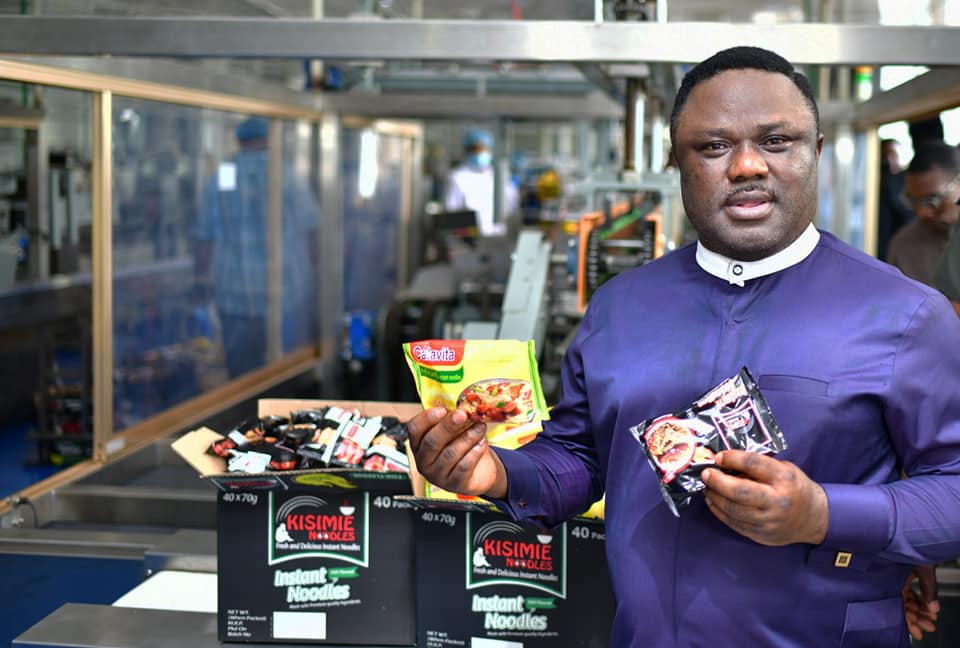The Calabar Noodles Factory As Part Of Government Mediated Private Sector
 The increasing urbanisation-induced fast-paced lifestyle of many societies around the world has necessitated the need for affordable quick meals. The constantly moving working population, in particular, look to foods that require minimal cooking to address their hunger needs. This reality has seen instant noodles become a staple meal in many Nigerian homes.
The increasing urbanisation-induced fast-paced lifestyle of many societies around the world has necessitated the need for affordable quick meals. The constantly moving working population, in particular, look to foods that require minimal cooking to address their hunger needs. This reality has seen instant noodles become a staple meal in many Nigerian homes.
However, even before instant noodles found its way into our menu in these parts, it had established its roots and formed a part of the food culture in Asia. Originating in Japan in 1958, instant noodles have come a long way from the ‘Chicken Ramen’ invention by MomofukuAndo; finding its way into Europe, the Americas, and eventually, Africa.
With rising income levels in developing countries in the 1990s came a corresponding increase in the consumption of instant noodles.
The World Instant Noodles Association estimated annual global demand for instant noodles to be approximately 15 billion servings in 1990, growing to 50 billion servings in 2001, and exceeding the 100 billion servings mark in 2012.
As economies of the world and markets continue to evolve, seeking swifter ways to get things done, the instant noodles sub-sector has held its place as a non-negligible contributor to the demands of this new reality. Factors such as affordability, convenience, safety and hygiene, long shelf life, palatability, and versatility make instant noodles desirable for a significant chunk of the global population.
 A survey conducted by Research and Markets revealed that the global Instant Noodles Market reached a value of $42.2 billion in 2018, registering a compound annual growth rate of 6.2 per cent during 2011-2018 while Globe Newswire in its Global Instant Noodles Industry Report predicted that the Global Instant Noodles Market will reach $32.1 billion by the year 2027.
A survey conducted by Research and Markets revealed that the global Instant Noodles Market reached a value of $42.2 billion in 2018, registering a compound annual growth rate of 6.2 per cent during 2011-2018 while Globe Newswire in its Global Instant Noodles Industry Report predicted that the Global Instant Noodles Market will reach $32.1 billion by the year 2027.
Noodles and pasta products are gaining increasing acceptance in Africa especially because of the continents massive young population who are more adventurous with food. And in many homes, instant noodles now make an appearance on the menu alongside (and in some cases, replacing) long-time staple foods such as rice, bread, and maize.
Noodles are one of the best investment opportunities due to their high economic worth and demand, which is why Governor Ben Ayade in his wisdom decided to build a plant to produce noodles.
The Cross River State Government under the leadership of Governor Ben Ayade completed its expansive noodles factory in 2020. It has undergone the final test in production preparatory to commencing commercial production. The company will commence full commercial production before the festive season.
The Calabar Noodles factory located in the Ayade Industrial Park by Goodluck Jonathan bypass was borne out of Gov. Ayade’s action plan in the rapid industrialization of the State by creating a government mediated private sector. It occupies 2000 square meters of land space and is flanked by the Calabar Pharmaceutical company, the Calabar Garment factory etc.
Since the outbreak of the Coronavirus pandemic, the demand for noodles has skyrocketed. Rice, pasta, and noodles continue to be very popular staples that are high in demand among the growing population. Thus, they saw a relatively good performance in retail in 2020 despite the poor economic conditions. Noodles remains a particularly convenient and cheap meal and thus continued to benefit from the growing Nigerian population as well as the home seclusions due to COVID-19 in 2020.
 Calabar noodles is of very high quality, it is made from rice as opposed to wheat. And the rice is freshly home grown rice. Calabar noodles comes in three flavours -Rice, Chicken and Suya. It is a digital replacement of existing noodles.
Calabar noodles is of very high quality, it is made from rice as opposed to wheat. And the rice is freshly home grown rice. Calabar noodles comes in three flavours -Rice, Chicken and Suya. It is a digital replacement of existing noodles.
With the Federal Government school feeding programme ongoing, the Calabar noodles factory becomes a potential partner in the provision of high quality noodles; Gov. Ben Ayade is bringing food technology and fusing it with the issues of food security. He is ensuring that Cross River wins a bit of the market share of the school feeding programme for which federal government has spent N228 billion.
With the high quality noodles, The Calabar noodles looks to take over the noodles industry in Nigeria. The factory has the potentials of launching the state into a noodle exporting state, apart from hugely meeting local consumption demands.
Short URL: http://www.senatorbenayade.org/?p=12189





























